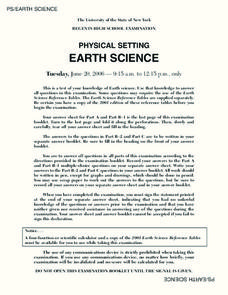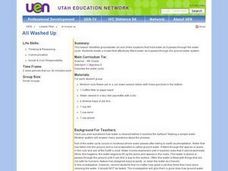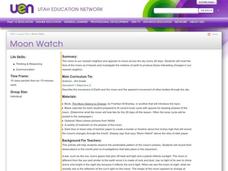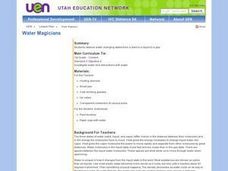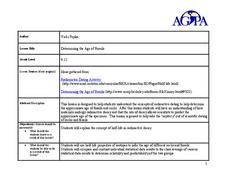New York State Education Department
Regents High School Examination: Earth Science - June 2006
In this earth science worksheet, students answer fifty multiple choice questions and thirty-three short answer questions in preparation for the earth science final exam.
Curated OER
Irresistible Irregular Verbs
Four fun games for practicing irregular verbs? How fabulous!
Curated OER
Little Me in a Big World: Ants
Students use the life cycle of an ant to learn about their own self-esteem. For this self-esteem lesson, students read books about ants and discuss obstacles from the stories as well as the ant behavior.
Curated OER
2nd Grade Physical Sciences
Second graders complete activities to measure motion and learn about the Earth's history. In this motion and Earth history lesson, 2nd graders discuss sound and complete a matching sound activity. Students then study the history of Earth...
Curated OER
Mineral Mixtures
In this science worksheet, students use basic scientific concepts to complete the series of puzzles that are intended to increase science literacy for classifying types of rocks and minerals.
Curated OER
The Wonderful world of Water
First graders examine the water cycle through readings and experiments. In groups, they conduct interviews with others and use the information to create a chart displaying the various uses of water. After brainstorming lists of ways to...
Curated OER
Science:Effects of Weathering
Seventh graders take an outdoor observation walk around the campus and take soil samples. Working in groups , they conduct experiments with rocks and soil that demonstrate the effects of different types of erosion.
Curated OER
Beach Life: Spanish Banks Field Trip
Students discover beach life. In this beach life lesson, students visit a beach to find plant and animal species that live there. They discuss the life cycle and needs of some of these animals through a variety of activities.
Alabama Learning Exchange
The Earth Has Many Layers
Students conduct an experiment. In this Earth's layers lesson, students learn about soil, sand and rock. They complete their own Jell-O Mountain and investigate the Earth's layers on-line.
Curated OER
Terrariums: A Look at the Living and Nonliving World
Third graders examine life in a terrarium and relate it to life in a larger environment. In this terrarium lesson plan, 3rd graders examine how living and non-living things work together by examining the changes in a terrarium. They make...
Curated OER
Rocky Intertidal Field Trip
Students investigate tides and the land submerged under them. In this intertidal field trip, Students visit the intertidal zone and observe the habitats and animals that live there. Students view the pools under rocks where lobsters...
Curated OER
Microbes in Long Island Sound
Students discover the harm and benefits of microbes. In this biology lesson, students explore water, nitrogen and carbon cycles. They investigate the factors affecting bacteria growth.
San Francisco Public Utilities Commission
What is Groundwater? Our Underground Water Supply
Learn about the consequences of groundwater with a lesson about the different ways California handles water conservation and pollution. After reading a passage about the water table, learners apply what they have read to six...
Mr. E. Science
The Earth in Space
Do you think Earth makes fun of other planets for having no life? The presentation covers the rotation and revolution of both the earth and our moon. It provides explanations for seasons, tides, and eclipses. Lesson is the 20th in a...
Curated OER
Earthquakes: Third Grade Lesson Plans and Activities
Introduce third graders to energy waves with a hands-on geology activity, in which they answer questions and compare seismograms in the San Francisco Bay area. After a demonstration that shows how bigger waves indicate a high-intensity...
Curated OER
All Washed Up
Fourth graders simulate filtration of water containing contaminates to determine how nature cleans water. They make predictions, report observations, and construct reasonable explanations concerning their outcomes. then connect this to...
Curated OER
Investigating Earth's Materials
First graders compare and contrast water from different sources. After collecting water from various sources, 1st graders create a list of observable properties of the water. Students then pour the water into a filter and observe the...
Curated OER
Moon Watch
Third graders read books about the moon and discuss its perceived changes as it moves across the sky. They observe the moon over the course of a month and chart their observations. They discuss their observations and conduct further...
Curated OER
Water Magicians
First graders observe water changing states from a solid to a liquid to a gas. They predict what they think happen to ice cubes as they sit out. They paint water with paintbrushes outside the classroom in the sun and watch the water...
Curated OER
Global Change — Change and Cycles Where Land, Air and Water Meet
Students participate in an experiment to define a parts-per-billion solution. For this ecology lesson, students select a second substance to create a parts-per-billion solution and observe and record their results. Students work in...
Curated OER
Determining the Age of Fossils
Students examine the concept of radioactive dating. In this radioactive dating lesson plan, students investigate how to determine the ages of fossils and rocks as they learn about half-life radioactive decay.
Curated OER
Changes in Nature
Fifth graders explore changes in nature. They identify chemical and physical changes in the water cycle, carbon cycle, and weathering. Students explore a chemical or physical change based on a chemical formula. They examine the effects...
Curated OER
Nothing New? A Physical Change
Fifth graders discuss the differences between chemical and physical changes. In groups, they complete experiments and discover how a physical chnage can be reversed. To end the lesson, they review the steps of the water cycle and...
Curated OER
Chemistry: Changing Materials
Students examine physical change with different temperature and solvents. In this elements and compounds lesson, students conduct experiments to discover what happens to the mass of a substance when is undergoes a physical change.


